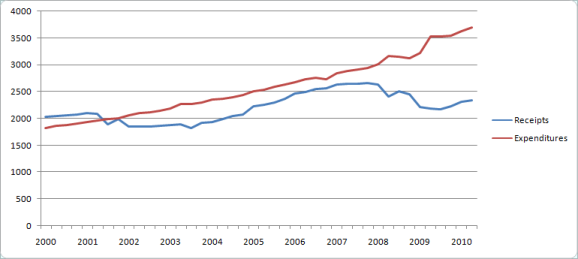Source: U.S. Bureau of Economic Analysis
So what can this chart tell us? Well for starters, we began the decade with a surplus, as federal receipts were higher than expenditures. In 2001 the first of what was to be known as the Bush Tax Cuts were enacted, which lowered revenue and dropped receipts below expenditures. The recession in 2002 and 2003 lowered revenue further, along with the rest of the Bush Tax Cuts, which were enacted in 2003. These factors kept federal receipts flat for a time, never catching up with expenditures again.
During the time before the current recession, there were three main factors driving the increases in expenditures, the war in Afghanistan, the war in Iraq, and the Medicare prescription drug program, all three of which took effect in 2002 and 2003, at the same time tax cuts were depressing revenue, causing the gap between expenditures and receipts that was the source of the federal deficit.
That brings us to more recent history, when the deficit began to really take off. As the chart shows, when the recession began in late 2007, expenditures continued to grow, but not at a significantly greater pace than they had been all decade. But as the economy sputtered to a halt, tax revenues fell, and federal receipts plummeted.
But spending has been higher, just not for the reasons the political ads would lead you to believe. To start with, the bailouts were a one time cost, and while substantial, it appears the government will get most of its money back. The stimulus bill had a large price tag, but 40 percent of it came from tax cuts. Another significant portion was aid to state and local governments. Only what was left consisted of federal spending. And unlike the 2003 Medicare program, these aren’t new programs, they are temporary measures enacted in response to the recession. The new health care law does create a new program, but according to the Congressional Budget Office, while it does have new spending, it is offset by cost-saving provisions, and actually will lower the deficit over the next ten years. In fact, according to the CBO, the combined costs of bailouts, the stimulus, and the health care law, will be less over the next ten years than costs of the Medicare prescription drug program, enacted back in 2003.
The real source of the increase in spending, just like the decrease in revenues, is due to the recession. Its no secret that the recession put millions of people out of work and in need of help, and indeed social safety net spending has increased. Between 2007 and 2009, unemployment insurance spending increased by $97 billion, Medicaid spending increased by $46 billion, and SSI, food stamps and other aid increased by $45 billion. This, along with a $73 billion increase in Medicare spending and $90 billion in Social Security spending with many new retirees, is to be completely expected in the face of the extraordinary economic downturn we have faced, and is government spending functioning exactly how it is intended.
Recessions will naturally cause budget deficits, and once the economy fully recovers, tax revenues will rise, safety net spending will fall, and the gap will begin to close. The problem is when the deficit is structural, like what we created in 2003, when new programs and spending were met with large tax cuts.
